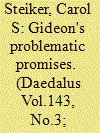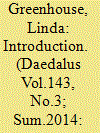|
|
|
Sort Order |
|
|
|
Items / Page
|
|
|
|
|
|
|
| Srl | Item |
| 1 |
ID:
132751


|
|
|
|
|
| Publication |
2014.
|
| Summary/Abstract |
The landmark case of "Gideon v. Wainwright" (1963) ensured the right of criminal defendants across the country to the effective assistance of counsel, but the overwhelming consensus is that the promise of "Gideon" has not been kept. Although there are significant differences in the delivery of indigent defense services across the country, there are four general reasons for the failure of "Gideon" that obtain across every jurisdiction and collectively cover much of the explanatory terrain: 1) its mandate is inadequately and precariously funded; 2) institutional impediments have impinged on the independence, training and oversight, and advocacy culture of indigent defense counsel; 3) legal remedies for ineffective assistance of counsel are often inadequate, inaccessible, or both; and 4) the ubiquitous practice of plea bargaining shields inadequate representation from view or remedy. Vindicating the right of poor people to effective representation in criminal cases remains a daunting but enormously important task.
|
|
|
|
|
|
|
|
|
|
|
|
|
|
|
|
| 2 |
ID:
132743


|
|
|
|
|
| Publication |
2014.
|
| Summary/Abstract |
This volume is both prequel and sequel. In 2008, Dædalus published an issue entitled "On Judicial Independence," exploring from a variety of perspectives the de½nition of that term, as well as ageold
and newly emergent threats to the ability of judges to do their work without undue constraint. Six years later, we both carry that story forward and shift the analytical frame to consider courts them selves: their past and ongoing evolution, and the work that a democracy can reasonably expect them to do. To write about courts is to write about political theory, about lawyering, about ½scal priorities, and about social welfare, as well as about courts' dependence on and independence from the body politic. The subject evokes a great variety of conversations, from the highly theoretical to the nitty gritty of service delivery for human needs in all their man - ifestations. Discussions of courts, at least in the United States, bring lawyers rapidly into view, along with criminal defendants, civil litigants, administrative agencies, budgets, public ½nancing, and popular opinion.
|
|
|
|
|
|
|
|
|
|
|
|
|
|
|
|
|
|
|
|
|